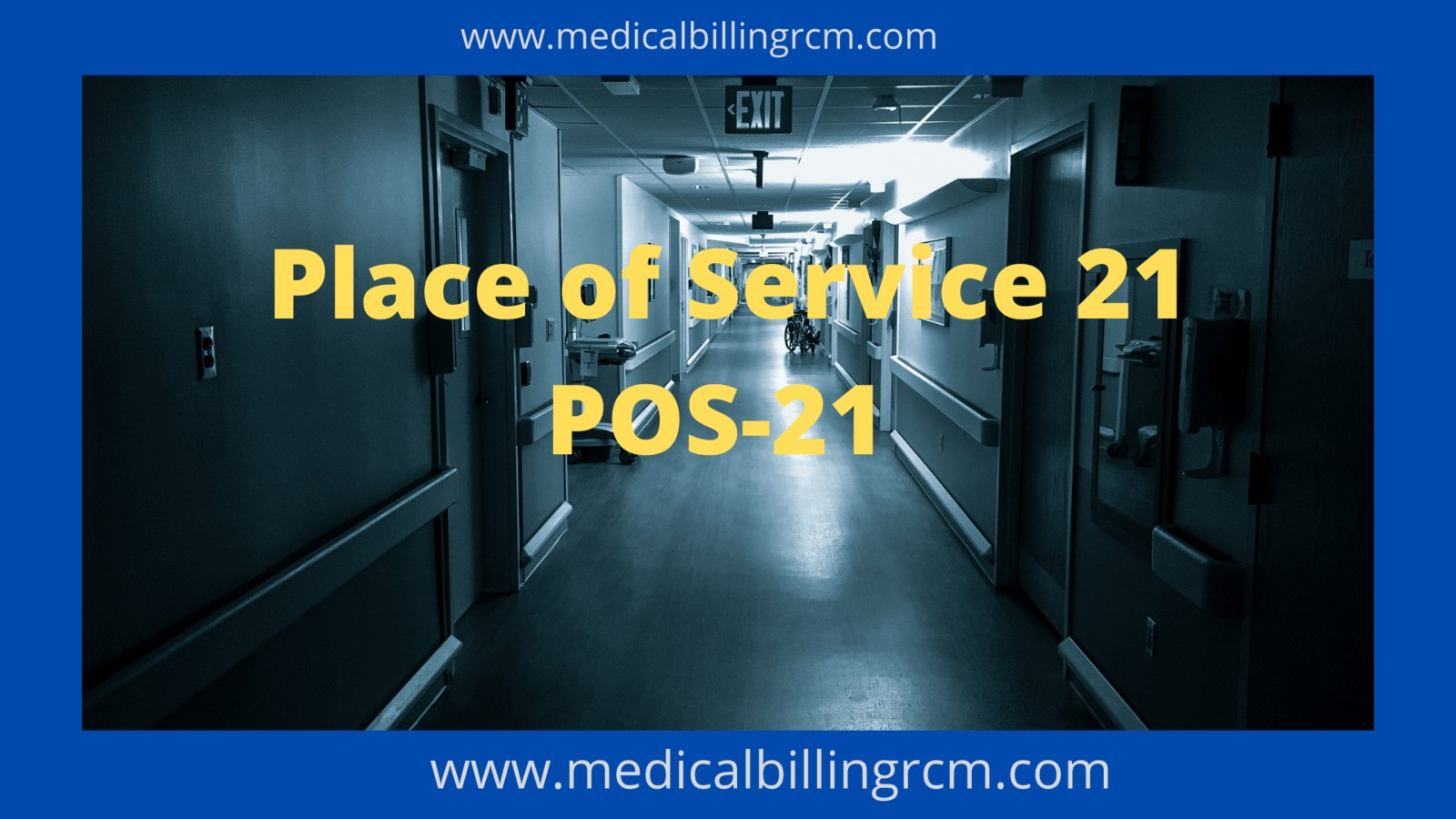When it comes to medical billing, the accurate identification of the place where a healthcare service was rendered is crucial. This information helps insurance companies and other stakeholders determine the appropriate reimbursement and ensure proper documentation. Place of Service (POS) codes were introduced to standardize this process. Among these codes, Place of Service 21 holds a specific meaning and significance.
Place of Service 21 is used for an inpatient hospital service. A facility that primarily provides diagnostic, therapeutic (both surgical and nonsurgical), and rehabilitation services under, the supervision of physicians to patients admitted for numerous medical conditions(Exclude psychiatric services) used this place of service code.
Table of Contents
- What is the ‘place of service’ code?
- Key Features of POS 21 in Medical Billing
- Benefits of Place of Service 21
- How to Use POS 21?
- Types of Inpatient hospitals
- Types of Inpatient provisions
- How health insurance companies cover Inpatient hospitalities?
- Insurance expenses levied
- To end up
- Related Articles:
What is the ‘place of service’ code?
The place of service(acronym POS) code refers to a two-digit code designed by Centres for Medicare and Medicaid Services(CMS) and designated to almost every health care industry.
This code set is required to place on health care professional claims to indicate the place in which a service was rendered.
The importance of POS 21?
The POS code and information becomes mandatory in governing the acceptability of direct billing of Medicare, Medicaid, and private insurance services.
There is around 99 Place of service codes maintained by CMS, and each code has its functionality.
Note well-It is absolutely crucial that you submit the health care claims with the correct ‘Place of Service’ codes. Failing to do so might result in denial of the service, or it can trigger the deduction of the wrong fee amount in lieu of the billing claims to insurance companies.
POS 21 (Inpatient hospital)
POS 21 or Place of Service 21 is that two-digit code used to specify an ‘Inpatient hospital,’ where services were rendered.
Place of Service 21 refers to “Inpatient Hospital.” This code is used when medical services are provided to patients admitted to a hospital as inpatients. It signifies that the services were rendered within the hospital setting and distinguishes them from other healthcare facilities or settings.
It withholds compiled facilities that provide the necessary healthcare services to the patients ‘admitted’ for different medical calls.
Under the supervision of maestro physicians and other healthcare workers, services such as therapeutic, surgical and non-surgical, diagnostic, and rehabilitation services(barring psychiatric support) are rendered.
Key Features of POS 21 in Medical Billing
To comprehend the importance of Place of Service 21, we must familiarize ourselves with its key features. Here are a few notable aspects:
Feature 1: Unique Identification: Place of Service 21 is a unique identifier for inpatient hospital services, ensuring accurate categorization and reimbursement.
Feature 2: Billing Purposes: This code is primarily used for billing and claim submission, allowing healthcare providers to specify that the services were provided within the inpatient hospital setting.
Feature 3: Insurance Coverage: Insurance companies rely on Place of Service 21 to determine coverage for inpatient hospital services and establish the corresponding reimbursement rates.
Benefits of Place of Service 21
Now that we understand the role and features of Place of Service 21 let’s explore the benefits it offers:
Benefit 1: Accurate Reimbursement: By using Place of Service 21, healthcare providers can ensure appropriate reimbursement for their inpatient hospital services.
Benefit 2: Transparent Documentation: Properly identifying the place of service through this code allows for transparent and accurate documentation of the healthcare services rendered to patients.
Benefit 3: Efficient Claims Processing: Insurance companies can process claims more efficiently when the place of service is indicated, leading to faster reimbursement for healthcare providers.
Benefit 4: Improved Data Analysis: Using Place of Service 21 enhances data analysis capabilities, enabling healthcare organizations to gain valuable insights into inpatient hospital services and optimize their operations accordingly.
How to Use POS 21?
Using Place of Service 21 correctly ensures accurate billing and documentation. Here’s a simple step-by-step guide:
Step 1: Identify Inpatient Hospital Services: Determine whether the medical services provided to a patient were performed within an inpatient hospital setting.
Step 2: Assign Place of Service 21 Code: Once confirmed that the services were rendered in an inpatient hospital, assign the Place of Service 21 code to the corresponding healthcare claim.
Step 3: Verify Accuracy: Double-check the accuracy of the assigned code to avoid any billing errors or discrepancies.
Types of Inpatient hospitals
The following types of hospitals dispense the essential inpatient services:
- Acute care hospitals(most common in type).
- Community hospitals.
- General hospitals.
- Teaching hospitals.
- Private non-profit hospitals.
- Proprietary hospitals.
Types of Inpatient provisions
◆Initially, patients have earmarked any ward or a room based on the care they require. It can be a general ward or a semi-private room.
◆After the admission procedure is fulfilled and the patient is finally granted admission, the ‘Inpatient care’ comes into force.
◆The assistance included,
- Pediatrics
- Medicine
- Surgery
- Obstetrics-Gynaecology
- Orthopedics
- Oncology
- Dermatology
- ENT
- Rehabilitation
10.Critical care units
11.Diagnostics such as radiology, cardiology, etc.
The list continues
◆A team of healthcare professionals is assigned to meet patient’s specific medical needs.
◆Consequently, inpatients enjoy the benefits of having a network of doctors and other healthcare practitioners with shared concerns for their speedy recovery.
How health insurance companies cover Inpatient hospitalities?
Inpatient medical facilities are generally considered to those seeking ‘admission’ in a hospital that requires one or more days of an overnight stay at home.
More vividly, you need corresponding permission from a doctor to formally accept and reap the benefits of healthcare insurance coverage plans under the Place of Service 21 description.
It should also be ensured that the hospital has Medicare facilities.
Notes-Overnight stay at the ‘Emergency room’ for ‘Medical observation’ doesn’t make you an Inpatient.
However, in some insurance plans, your share of the cost for staying in the ’emergency room’ is covered if you are admitted to the hospital eventually.
Insurance expenses levied
◾️Inpatient cost is broken into two parts,
- Facility fee(general nursing care, semi-private room, medications, meals, hospital equipment, and services.
- Fees allotted to surgeons/physicians.
◾️Any medicare is liable to cover the first 60 days of a hospital stay(after you have cleared your deductible amount.)
◾️After 60 days, a coinsurance cost comes into application.
◾️After 90 days, the bearing cost becomes the sole responsibility of the patient.
To end up
POS 21 is only worthwhile for patients who are registered officially into a respective hospital.
Place of Service 21, also known as Inpatient Hospital, plays a vital role in accurately identifying and categorizing medical services provided within a hospital setting. By utilizing this code correctly, healthcare providers can ensure proper reimbursement, transparent documentation, and efficient claims processing. Understanding the key features, benefits, and how to use Place of Service 21 is essential for healthcare professionals and organizations seeking to streamline their billing and administrative processes.
The insurance company takes the guarantee to cover all the pre-mentioned services. Sometimes, if there are allocations for extra services made, you may need to switch over ‘co-insurance’ strata.
Related Articles:
- POS 61| Place Of Service 61 in Medical Billing
- Place of Service 20 – POS 20 in Medical Billing 2026
- POS 34 | Place of Service 34 in Medical Billing
- Place of Service 19 | POS 19 Description in Medical Billing (2026)
- Place of Service 24 – POS 24 in Medical Billing (2026)
UB04 Type of Bill Codes List- TOB Codes
11 Place of Service | POS 11 in Medical Billing
Place of Service 23|POS 23 in Medical Billing
The author and contributor of this blog "NSingh" is working in Medical Billing and Coding since 2010. He is MBA in marketing and Having vaste experience in different scopes of Medical Billing and Coding as AR-Follow-up, Payment Posting, Charge posting, Coding, etc.

